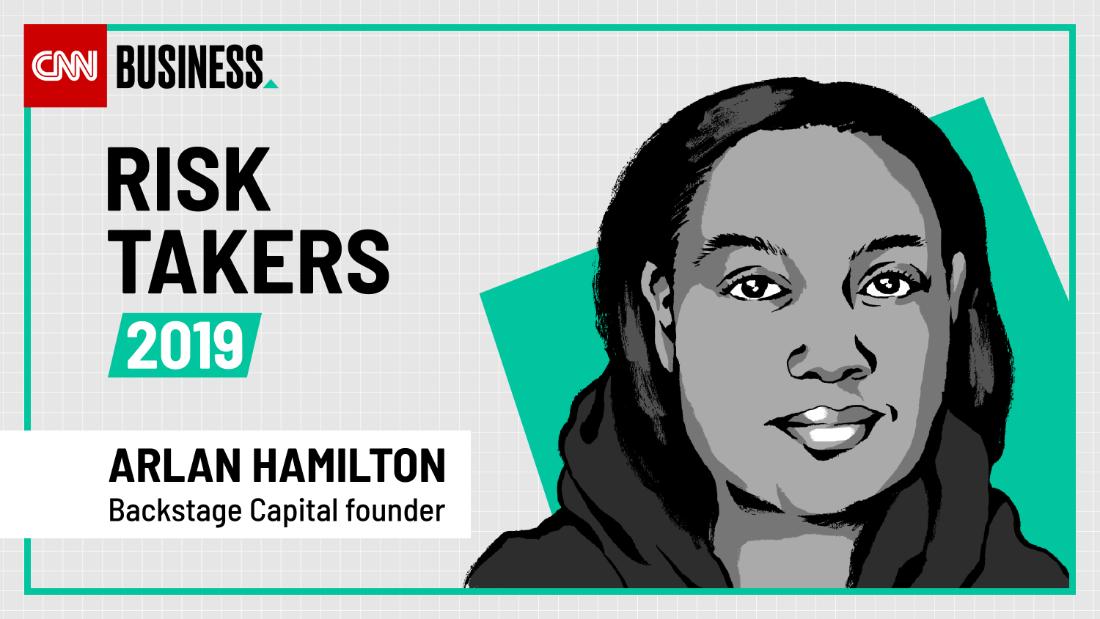
Arlan Hamilton stands out in Silicon Valley — not just because she’s a black investor in a white male-dominated field, but because she’s focused on investing in female, minority and LGBTQ entrepreneurs.
Hamilton, 38, is out to prove that what makes her different also makes her successful.
She refuses to execute on her mission quietly. She proudly goes up against investors known for “pattern matching,” a term for the practice of seeking out future entrepreneurs based on characteristics of past successful ones — in other words, they’re looking for the next Mark Zuckerberg.
Hamilton’s path may seem riskier to some, but it’ll pay off, she says.
“I will never be able to please everyone, and I’m not trying to,” Hamilton, the founder of venture capital firm Backstage Capital, told CNN Business.
Backstage Capital, which launched in 2015, invests in underrepresented founders who identify as LGBTQ, women and people of color. It’s already exceeded its first major benchmark: investing in 100 startups by 2020. In May 2018, Backstage Capital announced it met that number a year and a half early, investing $4 million in 100 startups to date.
Since then, Backstage has added more to its plate. That includes a $36 million fund devoted to investing solely in black female founders, and an accelerator program that helps startups with diverse founders scale their companies over the course of three months. The latter is launching this month in four cities.
Hamilton took a winding route to her first $500 investment check. Just a few years ago, she was homeless — sleeping in airports, on benches and on friends’ couches.
“It’s been this crazy roller coaster,” Hamilton said. “There are are really low lows and really high highs.”
The path to tech investing wasn’t exactly paved for her. In 2012, Hamilton worked in live music productionwhen she noticed a trend: Celebrities such as comedian Ellen DeGeneres, actor Ashton Kutcher and music manager Troy Carter were investing in startups.
“I thought, what’s going on? What is a ‘startup,’ basically?” Hamilton said.
- Judith McKenna: Walmart spent $16 billion to break into India. She has to make it work
- Gwynne Shotwell: She turns Elon Musk’s bold space ideas into a real business
- Read all 14 Risk Takers profiles
That curiosity led her down an information-seeking spiral that included years of research into startups, entrepreneurship and venture capital.
One revelation: “Everybody’s saying ‘no’ to even talking to the black [founders], like, no matter what they’re working on,” Hamilton said. “And in some cases, they were working on stuff that was so much more advanced.”
Data backs up what Hamilton saw. Black female founders, for example, have trouble raising money compared to their counterparts. According to a Project Diane report, the average initial round of funding for all startups raised in 2016 was $1.14 million. The average amount raised by a black female founder was just $42,000.
But Hamilton is the first to admit that her work is not charity.
“I’m looking at having obnoxious returns,” Hamilton is quoted as saying in “Leapfrog,” a 2018 book by investor Nathalie Molina Niño and author Sara Grace. “But I can do pattern matching and see that a black woman in her forties can get these returns. A typical VC can’t — he wants to see a hoodied white guy.”
Hamilton is known for being bold and unapologetic about her beliefs. She’s not afraid to call things as she sees them, which makes her a refreshing voice in the tech industry. The vast majority of VC investors are white men and 40% of them hail from Harvard or Stanford, according to research from venture capitalist Richard Kerby.
Then there’s Hamilton, who’s from Texas and didn’t go to college.
“I think there are a lot of really well-intentioned and well-executing white men,” she told CNN. “[But] I don’t make it my business to throw parades for doing what they’re supposed to be doing.”
Hamilton has been vocal abouther stances, including one about billionaire investor and entrepreneur Peter Thiel, cofounder of PayPal and data mining company Palantir. Thiel backed Donald Trump’s presidential bid and was a member on his transition team.
Hamilton tweeted in 2016 that she’d stop recommending entrepreneurs to Silicon Valley accelerator Y Combinator, where Thiel was a part-time adviser. At the time of the tweet, Y Combinator president Sam Altman, who Hamilton credits with helping her in the early days of Backstage Capital, originally said the firm wouldn’t cut ties with Thiel over his political views. But Y Combinator ended its part-time partner program with Thiel in November 2017. And, Hamilton ultimately turned down an investment from a founder tied to Thiel.
The decision “wasn’t simple — but it was easy,” Hamilton said. “I wouldn’t be able to live with myself.”
Hamilton, who is now based in Los Angeles and represented by Hollywood’s powerhouse Creative Artists Agency, said she’ll be working on potential television and book projects in the year ahead to answer questions such as, “How do we make eight-year-old black kids excited about starting a company or working as an engineer?”
“It’s about representation that is sorely missing,” she said.
Read more: www.cnn.com








![[Video] How to get rid of bed bugs in Toronto](https://www.thehowtozone.com/wp-content/uploads/2019/10/maxresdefault-2-100x70.jpg)


